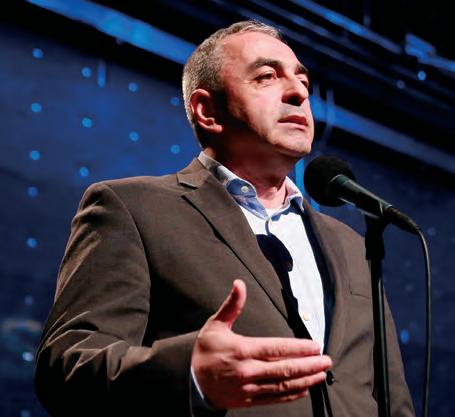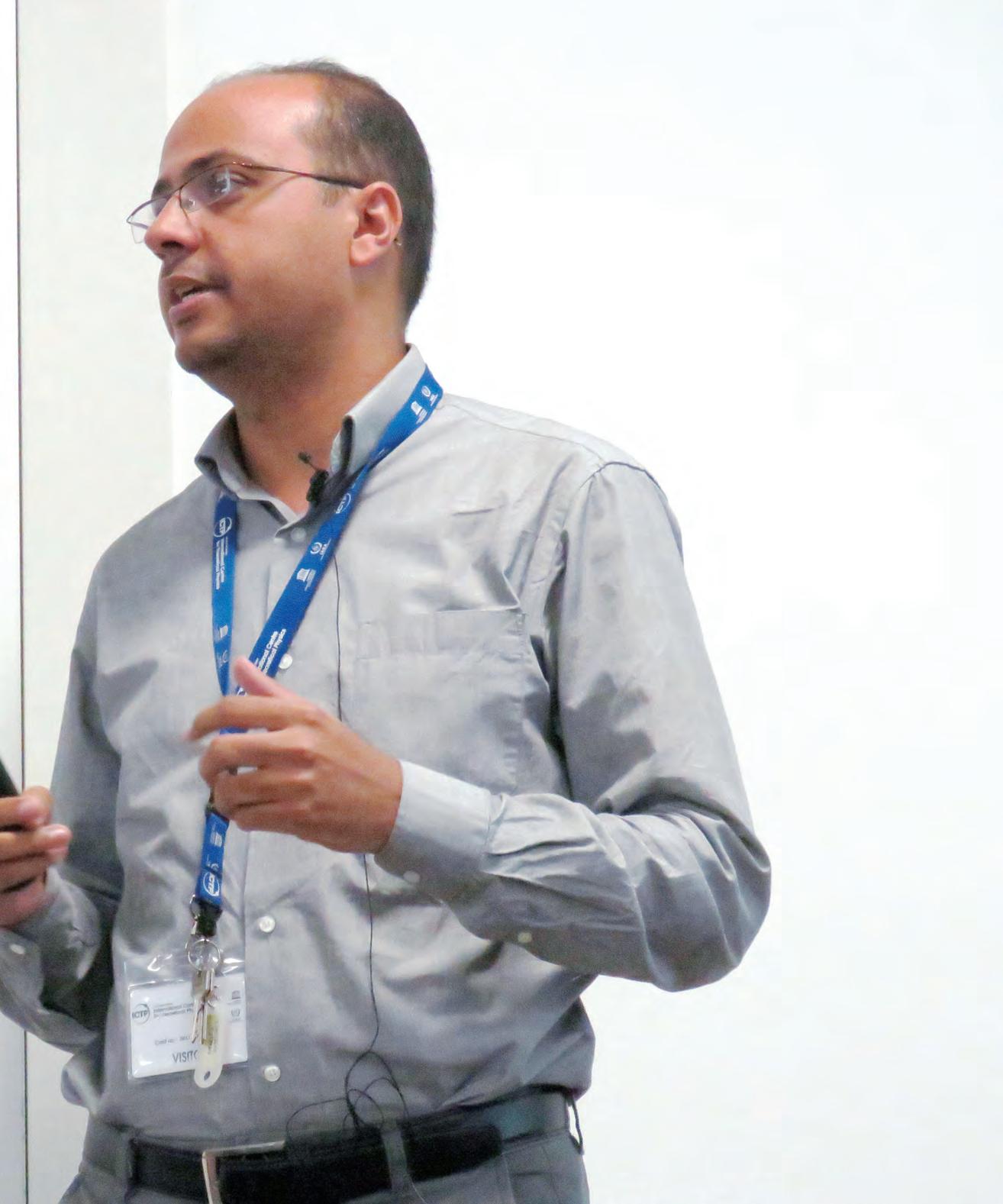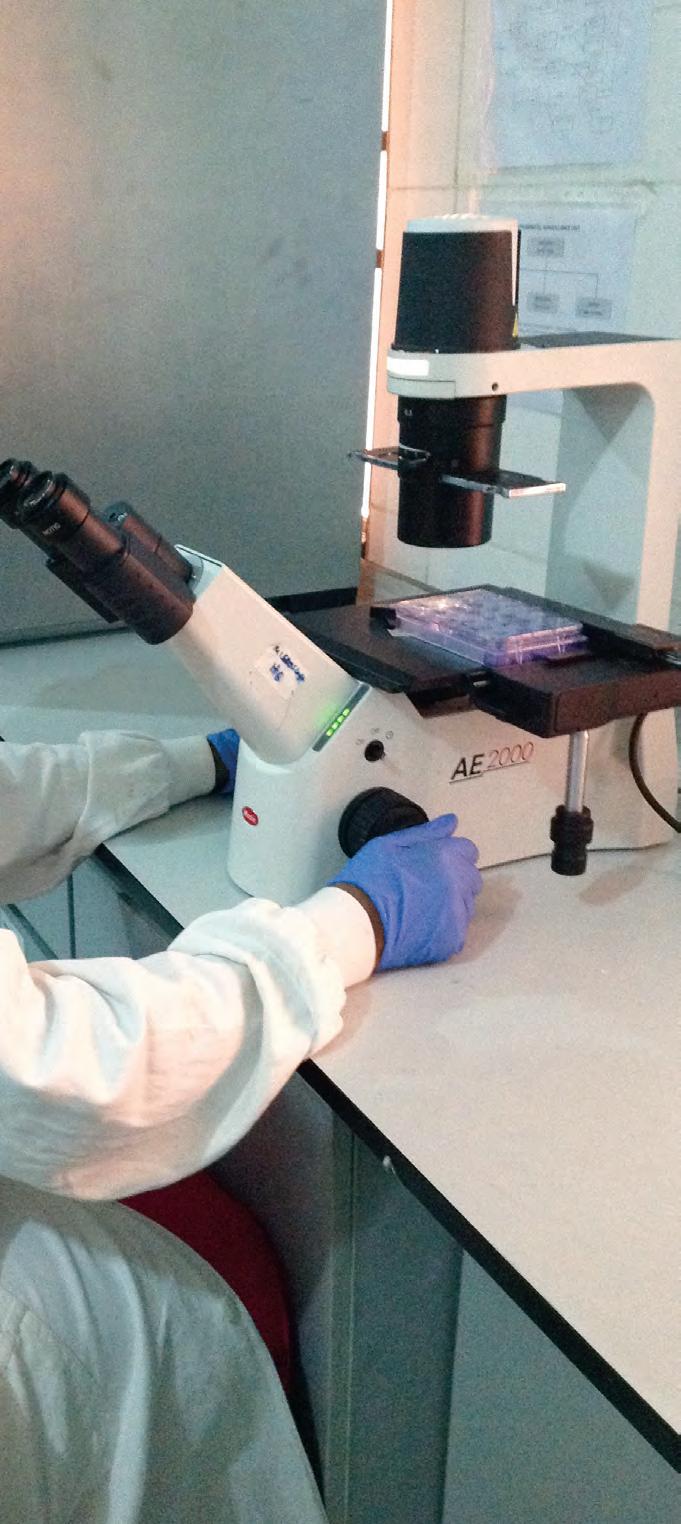
9 minute read
Changing Communities and Promoting Social Justice explores the engagement of IIE-SRF alumni with their communities beyond academia and how alumni living abroad remained connected to their home communities
IIE-SRF alumni who identified as religious minorities in their home countries or as racial or ethnic minorities at home or in their current countries were more likely to actively engage in supporting disadvantaged populations in their communities. Instead of being a barrier, belonging to a minority group may be a motivating factor behind active community involvement.
A total of 113 IIE-SRF alumni (55%) contributed to their home communities and 82 alumni contributed to their new communities (Figure 9). 50 alumni contributed to both their home communities and their new communities.
Advertisement
COMMUNITY ENGAGEMENT BY LOCATION
The data in this graph shows location of impact, not of the alumni.
IN THE HOME COUNTRY
Engaged in promoting and supporting social justice
43%
Supported disadvantaged populations in my community
Increased intercultural learning and understanding in my community
Spoke at a community event about my work
Took on a mentorship role for youth or young professionals in my community Initiated or participated in a professional project that benefited people in my community Led or collaborated in developing a workshop in my community Organized a local competition for youth or young professionals related to my field
11% 33%
32%
30%
29%
28%
27%
Figure 9: IIE-SRF alumni's community outcomes, by country of impact * Only alumni residing in new countries were asked about their community engagement with the new communities. OUTSIDE OF THE HOME COUNTRY
36%
24%
42%
40%
21%
23%
25%
12%
Location of the alumni — in their home countries or abroad — made a difference for some types of community engagement but not others. For example, alumni promoted social justice, supported disadvantaged populations, and mentored youth or young professionals in their home communities regardless of their current country of residence. Conversely, IIE-SRF alumni who lived abroad had greater opportunities to increase intercultural learning and understanding in their new communities, partially because these communities may have been less familiar with the alumni’s cultures.
The time elapsed since completion of the IIE-SRF fellowship did not influence alumni’s ability to engage with their communities: Alumni who recently completed their IIE-SRF fellowships were as likely to report impacts on their communities as alumni from the early 2000s.
An example of the breadth of impact that IIE-SRF alumni can have on their home countries, new communities, and the world at large is the establishment of the Institute for International Health and Education by Arash Alaei, an Iranian alumnus currently in the United States (IIE-SRF Fellowship: SUNY Albany, United States, 2012). The Institute, which aims to improve access to health and education, impacted the scholar’s home country of Iran by “providing training and mentorship to healthcare workers in Iran on COVID-19 medical care.” Beyond this, much of its work is globally oriented, including “working to improve the quality of HIV service in Tajikistan, and providing a series of training workshops on HIV and Viral Hepatitis in Turkey, Romania, Russia, Lebanon, and Tajikistan.” The Institute also serves the alumnus's current community of Albany, New York, through its work to “increase law enforcement knowledge and build better understanding, communication, and trust between the Albany Police Department and refugee community.”
Remaining Connected with Home Country Academia
Both IIE-SRF alumni who returned home following the conclusion of their fellowships and those who remained abroad continued to engage with their home countries’ academia and contributed their expertise to academic, policy, and other discussions about their home countries. This connection persisted and was integral to their careers and lives. In this section we look at the experience of IIE-SRF alumni living abroad with their home country academia.
Three out of four IIE-SRF alumni living abroad remained connected to their home country academia since their IIE-SRF fellowships (Figure 10).
HOW HAVE YOU MAINTAINED ACADEMIC CONNECTION TO YOUR HOME COUNTRY?
I kept in touch with former students in my home country
I kept in touch with faculty in my home country
I published work, participated in conferences, or taught courses related to my home country
I engaged with the academic diaspora from home country in my current country
I published work in my home country
I participated in distance learning activities with institutions in my home country
72%
59%
57%
52%
33%
29%
Figure 10. IIE-SRF alumni’s engagement with home country academia
Remaining in touch with faculty and students was the most common form of sustaining connections with their home countries and institutions: 75% have done so, and 11% were planning to. More recent alumni were more likely to report that they continued to actively communicate with faculty and students from their home countries.
SUFIAN ZHEMUKHOV
IIE-SRF alumnus and political scientist from Russia (George Washington University, U.S.)
75%
OF IIE-SRF ALUMNI
have remained in touch with faculty and students to sustain connections with their home countries and institutions
57%
OF IIE-SRF ALUMNI
More than half of IIE-SRF alumni abroad (57%) incorporated topics related to their home countries into their publications, presentations, and coursework, and an additional 24% of alumni intended to do so. For example, Saad N Jawad, an Iraqi alumnus living in the United Kingdom had published books and articles on Iraq, analyzing the Iraqi constitution, and together with his wife Sawsan M I al-Assaf, also an IIE-SRF alumna from Iraq, published a book “on the effects of occupation on Iraqi women.” A Cambodian alumnus wrote books discussing the response of the Cambodian government to the Khmer Rouge regime, the current land grabs by the Cambodian government, and the deportations of Cambodian diaspora members from the United States.
Another critical way IIE-SRF alumni remained engaged with their home country academia was through the diaspora communities, primarily in their new countries. Half of the alumni living abroad had engaged with academic diaspora from their home countries, and 23% of alumni would like to reach out to these diaspora in the future.
“I was motivating most of my ex-Eritrean students in the diaspora to continue their higher education, profession in order to be prepared with knowledge for the future in case after the regime change at home.”
IIE-SRF alumnus
Eritrea, 2011-2013 / Norway (University of Oslo), currently in Norway
“[I laid the] foundation for building and empowering a diaspora community through educational, health and financial literacy programs [and received an award for] my leadership in running the association as Pioneer Chair and President at the 10th anniversary celebration.”
IIE-SRF alumnus
Cameroon, 2004-2005 / United States, currently in the United States
Just under a third of alumni participated in distance learning activities with higher education institutions in their home countries. Such opportunities were, in some cases, facilitated by other organizations or governments. For example, nearly half of the Iraqi alumni living abroad have participated in distance learning with Iraqi institutions. The high percentage of Iraqi participation is influenced by IIE-SRF’s Iraq Distance Learning Initiative, which offers opportunities for Iraqi alumni living in the diaspora to deliver live academic lectures and full courses at Iraqi higher education institutions that fill curricular and expertise gaps. This initiative is implemented in partnership with Iraq’s Ministry of Higher Education & Scientific Research and its IIE Coordination Committee, led by an IIE-SRF alumnus.
“[I am] participating in online lectures aired to institutes in Baghdad and Tikrit via IIE programs in Amman, Jordan.”
Adnan Yaseen AL-Quraishi
IIE-SRF alumnus from Iraq, 2007-2009 / Jordan (Jordan University of Science and Technology), currently in Jordan
Conversely, other governments may limit alumni’s opportunities to support their home higher education systems through distance learning. For example, only three Syrian alumni have participated in distance learning activities. One alumnus suggested that the ability of Syrian alumni to teach Syrian students remotely may be limited by a government prohibition for some alumni to teach in Syria.
AMER AL-QAAOD
IIE-SRF alumnus and nuclear physicist from Yemen (International Centre for Theoretical Physics, Italy)
Just under one-third of IIE-SRF alumni

Conclusion
IIE-SRF gave me the opportunity to rebuild my career in a safe environment. This will push me forward and make up for what I lost in Yemen during the war and due to the pressures and threats I faced in the universities where I worked. The fellowship allowed me to reclaim my future, which I thought I had lost.” These are the words of Dr. Afrah Al-Khawlani, a Yemeni nuclear physicist and expert in nuclear power reactors, who completed the IIE-SRF fellowship at Philadelphia University in Jordan. Since 2002, IIE-SRF has saved the lives and careers of over 900 scholars, who, like Dr. Al-Khawlani, are creating a better and more just world through their teaching, research, and advocacy.
As dedicated educators, IIE-SRF alumni shared the wealth of their knowledge with tens of thousands of students around the globe in the context of both courses and individual mentorship, creating an impressive multiplier effect. Those alumni who taught in their home countries — whether returning or via distance learning — exposed students to international academic practices and opportunities, many of which the scholars became familiar with through their IIE-SRF fellowship appointments, thus diversifying the global academic voice and strengthening their home countries’ academies. Alumni who lived and taught abroad used teaching as an opportunity to share their culture and unique experiences and expertise with the students, internationalizing their campuses and increasing their students’ knowledge and cross-cultural competency.
Leading experts, IIE-SRF alumni continued to build their legacy of contributions to academic and scientific knowledge that inform academic discussions and debates around current public policy and issues impacting their home countries, new countries, and the global community. Since completing their IIE-SRF fellowships, alumni disseminated their knowledge via more than 10,500 scholarly publications, presentations, artistic works, and public appearances. Their published works included almost 450 books and book chapters and more than 1,900 articles in academic journals, newspapers, and magazines. Several of the organizations that alumni founded produced and disseminated academic knowledge, with a focus on decolonizing the academic thought in their countries and the global discourse.
Through all these activities, IIE-SRF alumni leveraged the relationships they built with colleagues during their IIE-SRF fellowships. Most remained in contact with these colleagues. Many collaborated on projects and put their minds together to enrich courses they taught and establish student exchanges between their institutions.
IIE-SRF alumni demonstrated an unwavering commitment to social issues, with many working to increase access to education and support disadvantaged populations and advocating for academic freedom and social justice in their home countries. Alumni’s commitment to social justice was also shown in their own organizations, whose missions and achievements promoted equity and dignity for all.
Perhaps most impactful is the conclusion that regardless of whether IIE-SRF alumni returned to their home countries or remained abroad, they were, and continue to be, passionate about bettering their home countries and the world overall in every aspect of their professional lives. Their commitment as individuals and social justice leaders speaks to the important contribution they are making well beyond their academic roles.
MARYCELIN BABA
IIE-SRF alumna and microbiologist and virologist from Nigeria (University of Cape Town, South Africa and International Centre of Insect Physiology and Ecology, Kenya). Dr. Baba directs the WHO-accredited Polio laboratory at the University of Maiduguri Teaching Hospital in Nigeria and is currently coordinating the laboratory testing for COVID-19 in Borno State.

IIE-SRF alumni have completed 10,500
450
these include
BOOKS AND BOOK CHAPTERS





